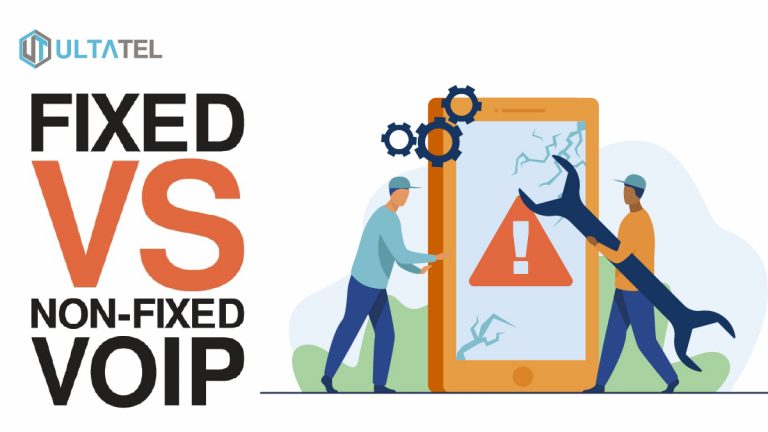Mobile and landline numbers are nothing new, but you may be unfamiliar with non-fixed VoIP numbers. Whether you run a small business, are scaling your enterprise to run internationally, or are looking for some added privacy, non-fixed VoIP numbers can provide the security and flexibility you need.
Unlike fixed VoIP numbers, their non-fixed counterparts are not geographically restricted, opening the door to broader connectivity opportunities. Learn more about how a non-fixed VoIP number works and how it continues to transform how we communicate online.
What is a Non-Fixed VoIP Number?
A non-fixed VoIP number is associated with a Voice over Internet Protocol (VoIP) service but not tied to a specific physical address or location. VoIP technology allows voice communications to be transmitted over the internet rather than traditional phone lines.
By comparison, non-fixed VoIP systems are more commonly implemented than their fixed counterparts. Examples include Skype, Viber, and UTATEL.
How Does a Non-Fixed VoIP Number Work?
You only need an email address and payment method to obtain a non-fixed VoIP number. Unlike traditional counterparts, non-fixed VoIP numbers can be assigned to any area code.
To use a non-fixed VoIP number, a user must:
- Subscribe to a VoIP service provider that specializes in offering phone services over the internet
- Have a reliable internet connection, such as broadband, WiFi, or mobile data
- Install VoIP software like Skype, Google Voice, Vonage, or ULTATEL
- Receive their non-fixed VoIP number from their provider, which they can choose from a list
Once the non-fixed VoIP number becomes active, users can enjoy the following services:
- Call Routing: When a user calls the non-fixed VoIP number, the call goes through the VoIP service provider’s infrastructure. The voice data is converted into digital packets and transmitted over the internet to the recipient.
- Conversion to Analog: If you call a traditional phone number, the VoIP service provider will convert the digital voice data back into an analog format for delivery to the conventional phone network. Users can then receive the call via a mobile phone or landline.
- Other Features: Non-fixed VoIP services offer additional features such as call forwarding, voicemail, call recording, conferencing, and more. These features enhance functionality and flexibility.
What’s the Difference Between a Non-Fixed VoIP and a Fixed VoIP?
The primary difference between a non-fixed and fixed VoIP is that the former is not linked to a specific location or address. Thus, non-fixed VoIP users can access phone services over the internet.
However, non-fixed VoIP numbers are less secure and can be easily hacked to use anonymously. This feature has led to concerns regarding their misuse, such as for illegal activities or fraudulent purposes. To combat this, some organizations and institutions may block or restrict calls from non-fixed VoIP numbers to mitigate potential risks.
Non-Fixed VoIP Pros and Cons
Pros
Mobility and Flexibility
Non-fixed VoIP numbers allow you to make and receive calls from anywhere with an internet connection. You can use your number on multiple devices (computers, smartphones, tablets) without being tied to a specific physical location.
Compared to fixed VoIP: Easier to use anywhere, generally more accessible.
Cost Savings
VoIP services, including non-fixed VoIP numbers, are often more cost-effective thanks to lower calling rates, especially for long-distance or international calls. Additionally, many VoIP providers offer bundled services and unlimited calling plans, reducing overall communication expenses.
Compared to fixed VoIP: More affordable, sometimes free.
Feature-rich Functionality
Non-fixed VoIP numbers typically come with various advanced features like call forwarding, voicemail, call recording, auto-attendant, virtual phone numbers, and conference calling, enhancing communication capabilities and productivity.
Compared to fixed VoIP: On par with features.
Scalability
Non-fixed VoIP numbers can quickly scale with your needs. Whether you’re an individual or a growing business, VoIP services allow for easy expansion and adding more lines or extensions as required.
Compared to fixed VoIP: More scalable, as it is not tied to a physical address.
Integration with Other Applications
VoIP services can integrate with other communication tools and software applications, enabling unified communications, such as combining voice calls with messaging, video conferencing, and collaboration tools.
Compared to fixed VoIP: Easier to migrate to other software.
Cons
Emergency Services Limitations
Because of their lack of a fixed physical address, non-fixed VoIP numbers are not ideal for making emergency calls, as traditional emergency services may not determine your exact location automatically. However, some VoIP providers have implemented solutions to address this concern, such as requiring users to register a physical address or providing enhanced 911 services.
Compared to fixed VoIP: Potentially unable to make 911 calls.
Reliability and Call Quality
Non-fixed VoIP services rely on internet connectivity, and if the connection is unstable or experiences issues, it can affect call quality or result in dropped calls. Factors like network congestion, bandwidth limitations, or power outages can impact the reliability of the service.
Compared to fixed VoIP: Less reliable in a mobile setting.
Dependence on Internet Connection
Non-fixed VoIP numbers require a stable and reliable Internet connection. If your internet service is disrupted or unavailable, you can only make or receive calls after restoring your connection.
Compared to fixed VoIP: Must be connected to a stable network.
Limited Compatibility
While non-fixed VoIP numbers work well with most modern devices, they may only be compatible with some older or specialized phone systems.
Compared to fixed VoIP: No viable connection to legacy phone systems.
Misuse and Security Concerns
Non-fixed VoIP numbers are vulnerable online and frequently stolen. Hackers can use these numbers for malicious purposes, including spam calls, fraud, and illegal activities.
Compared to fixed VoIP: Prone to hacking.
Non-Fixed VoIP vs. Fixed VoIP for Business
Whether you employ a fixed or non-fixed VoIP system will ultimately depend on the following factors:
- Geographical Location: You may be better off with a fixed VoIP if you run an established business with a set geographical location. However, a non-fixed VoIP system may better suit companies with remote workers.
- Scaling Plans: If you plan to scale internationally, a non-fixed VoIP system may better support the need to make international calls and hire remote talent. Not to mention, incorporating a fixed VoIP system at a new location can be costly.
- Customer and Prospect Locations: Do you collaborate with international stakeholders and service global customers? If so, choose a non-fixed VoIP system.
Non-Fixed VoIP FAQs
Can you trace a non-fixed VoIP number?
You can trace a non-fixed VoIP number, though doing so may be challenging because of a lack of a physical address. In addition, users can obtain non-fixed VoIP numbers anonymously, making it more difficult to associate with a specific entity.
How do you know if a VoIP number is fixed or non-fixed?
The easiest way to tell whether a VoIP number is fixed or not is to determine whether it ties back to a physical address. You can discover the necessary information through the following sources:
- Service provider
- Online search
- Reverse phone lookup
- Regulatory databases
Who uses non-fixed VoIPs?
Non-fixed VoIPs are common among SMBs, remote workers, freelancers, call centers, international businesses, and individuals requiring additional privacy because of their flexibility, ease of use, connectivity capabilities, and cost-efficiency.
Can you call non-fixed VoIP numbers?
You can call non-fixed VoIP numbers as they are programmed to receive incoming calls like traditional mobile or landline numbers. However, calling a non-fixed VoIP number from a fixed line may incur charges.
Can you block non-fixed VoIP numbers?
You can block non-fixed VoIP numbers if your service provider has call-blocking features. Alternatively, you can add these numbers to do-not-call lists or use a call management app.
Can you text non-fixed VoIP numbers?
You can text non-fixed VoIP numbers using SMS apps, messaging platforms, web-based messaging software, or API integrations.
Summary
As non-fixed VoIP numbers continue to gain popularity, it’s impossible to ignore their impact on communication practices. With their inherent mobility, cost-effectiveness, and feature-rich functionality, non-fixed VoIP numbers have revolutionized how businesses operate, individuals connect, and remote work thrives.
While they offer unparalleled flexibility, challenges such as emergency services limitations and concerns regarding misuse remind us of the need for responsible usage. As communication technology evolves, it’s imperative to balance harnessing the benefits of non-fixed VoIP numbers and addressing the associated considerations.

